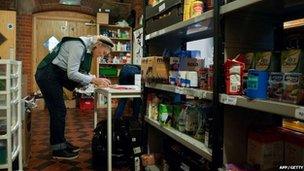Benefits changes: Warnings as crisis loans scrapped
- Published

Some councils are investing in food banks as crisis loans are cut
A national scheme to aid vulnerable people in financial trouble is ending just as demand for such help is expected to surge, campaigners warn.
Community care grants and crisis loans paid through job centres, as part of the social fund, will end on Monday.
Instead, councils in England and the Scottish and Welsh governments are being given funding to provide alternatives.
Critics warn demand will rise as the government's welfare changes kick in.
And, they fear, the changes means help for tens of thousands of people will be a "postcode lottery", meaning the level of aid they get will be dependent on where they live.
Repaid through benefits
Previously, those in need could turn to the fund, which offered loans averaging about £50 to overcome short-term financial crises - usually caused by delayed payments or unforeseen circumstances.
Loans were repaid through benefits.
Separate community care grants were available to vulnerable people, including domestic violence victims or those leaving care, to help them buy goods needed to return to independent living.
But the changes mean that those in need now face widely varying offers of support from local authorities, depending on where they live.
Many councils are planning to offer offer food stamps or redeemable vouchers for furniture.
Some will exclude newcomers to the area, while others will outsource the service or consider linking payments to "good behaviour".
The government says devolving the £178.2 million funding to local control will make sure it gets to those who are most in need.
But it has not set any rules on how councils spend the money, and funding is not guaranteed at all beyond April 2015.
Funding for this year will be roughly equal to the current annual cost of the loans and grants in each local area.
Critics say demand is due to surge as the government's welfare changes kick in.
Thousands of households with spare rooms will see their housing benefit payments cut, and millions of working age claimants will be forced to pay a contribution towards their council tax for the first time.
Damon Gibbons, director of the Centre for Responsible Credit, said: "There is no doubt that there will be increased need, whether or not it is met will depend on how well schemes are managed and advertised, and what access arrangements are in place.
"The consequence will be more people relying on charitable hand-outs and food parcels or turning to high cost commercial lenders.
"There has been an abdication of the government's duty of care to many of the most vulnerable who will be left with no real idea about where they will get this assistance."
He described the new arrangements as a "postcode lottery" for claimants.
'Absolutely desperate'
Charities like the Child Poverty Action Group have also raised concerns about the changes.
It said one third of all claimants using the social fund are disabled and that for most it is a "place of last resort".
More than 2.1 million crisis loans and 216,000 care grants were paid out in 2011/12.
Annual spending on the social fund has already been declining.
Stoke-on-Trent City Council is among those scrapping loans as it does not have the power to recoup them from benefits.
Instead it will hand out vouchers for food and household equipment.
Council tenant Susan Carbone is waiting to be re-homed by the authority to avoid losing more than £1,000 in housing benefit for the two spare rooms in her house.
The 53-year-old, who said she is unable to work due to dyslexia and problems with her back and knee, will also pay 30% of her council tax for the first time.
She said: "I had one crisis loan which I really needed and they took the money back from my benefits. I wouldn't go to them unless I was absolutely desperate. They seem to be taking everything away."
Tristram Hunt, Labour MP for Stoke-on-Trent Central, said: "There's something that makes me instinctively very wary about the move towards food stamps and vouchers.
"It's more and more like the American welfare model with different services in different states. The consequences can be poor provision and a race to the bottom."
'Expected behaviours'
Manchester City Council said the current funding is prone to misuse - including cases where claimants squander benefits and then request a loan - and could in future link its support to "expected behaviours and actions".
Newham Borough Council in London said the government's funding is "likely to be insufficient."
It will continue loaning money but limit crisis payments to people who have lived locally for six months and give bigger grants to residents of at least one year.
In Somerset the funding will be managed by Citizens Advice bureaux, while Hampshire County Council is investing £35,000 in food banks as part of its plans.
A spokesperson for the DWP said: "We're reforming the social fund because it is complex, over-centralised and poorly targeted, and replacing it with local provision to ensure this money goes to those most in need."
- Published28 March 2013
- Published29 April 2013
- Published26 March 2013
- Published13 March 2013